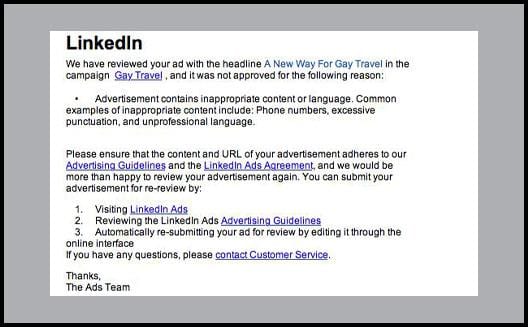
Here is a screen capture of the email LinkedIn sent to Open Mic Press after pulling its ad for The Gay Travel Guide For Tops and Bottoms on Aug 30 (links not active).
The professional networking site LinkedIn has pulled an ad for a gay travel guide, claiming it contains “inappropriate content or language.”
“It’s baffling,” says Robert Christofle at Open Mic Press/Icon Empire Press.
Christofle says he’s been promoting The Gay Travel Guide For Tops and Bottoms on a variety of sites, many of them straight, without incident. But LinkedIn, which has networks ostensibly catering to gay professionals, censored the ad.
An email sent to Christofle from LinkedIn on Aug 30 says the ad was pulled because it violated the company’s content and language guidelines. According to the email, “common examples of inappropriate content include: phone numbers, excessive punctuation and unprofessional language.”
Christofle maintains the travel guide’s ad adhered to LinkedIn’s guidelines. He suspects the ad was pulled because of a potentially sexual image on the book’s cover. “It’s a very suggestive letter A,” he says.
Though the book cover contains no overt sexual imagery, the letter A in its title could subtly suggest two people having sex doggy style. “It’s very tongue in cheek,” says Christofle.
LinkedIn says it pulled the ad due to its sexual content.
“LinkedIn is a professional networking platform and, as such, there has never been a place on it for ads that feature or promote explicit sexual content or products of any kind,” spokesperson Danielle Restivo told Xtra on Sept 1.
The fact that it was a gay guide did not influence LinkedIn’s decision, Restivo says. “We just want to dispel any notion that this has anything to do with sexual orientation. It 100 percent does not.”
“It’s the wording, the imagery or the site to where the ad links,” she says, when asked what the company would consider sexually inappropriate advertising.
Restivo says that in this particular case the ad was pulled because of its wording and the site to which it linked. Christofle doesn’t buy it.
“The link is not sexual,” he says. “It’s to the book-sales page.”
Google Ad and Facebook haven’t objected to the ad, Christofle notes. “Out of the three different advertising sites, only LinkedIn has a target gay networking site, and they are the only ones to pull the ad.”
Christofle objects to what he sees as LinkedIn’s double standard on sexual content. He says the networking site allows groups promoting lesbian erotica and online sex companies to post content.
“Anyone is free to start a group,” Restivo explains. “We’ve looked into the groups and found they are for professionals in the industry.”
But any companies violating LinkedIn’s user agreement will be addressed, she promises. “We will look into this, and if we find that they violate the user agreement then we will take action.”
As for its policy on advertisements, Restivo says that LinkedIn stands behind its guidelines and that if ads don’t comply with them they will be pulled.
She says ads with explicit or sexual content have been pulled in the past. One such ad was for a sexual enhancement drink, she says. Another was for an intimate apparel company.
“It has nothing to do with sexual orientation; it’s the nature of the network,” Restivo reiterates, adding that the site boasts more than 400 online networking groups aimed specifically at gay professionals.
Christofle says Open Mic Press/Icon Empire Press appealed to LinkedIn to repost its ad but was rejected.

 Why you can trust Xtra
Why you can trust Xtra


